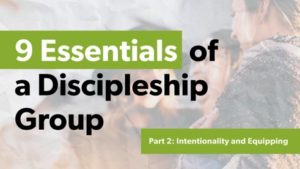Should I Disciple Towards Proficiency or Creativity?
As a disciple maker, the choice is yours. Like any process-oriented endeavor, there are countless small decisions that impact the outcome. The most fruitful disciple makers choose intentionally, not unknowingly. To do that, disciplers must carefully consider how they disciple.
Many discipling decisions have clear and obvious trade-offs, such as what happens if I don’t cast vision? What happens if I only use one side of the disciple making scale? However, other choices aren’t as clear- such as, “What form should my disciple making take?” and as we’ll discover in this post, “Should I disciple towards proficiency or creativity?”
In a disciple making context, what’s the difference between proficiency and creativity?
To disciple towards proficiency means to engage around a previously defined sequence of lessons.
This works best in a discipleship group (a.k.a. d-group, journey group, micro group, etc.) as it provides a pathway that syncs focus, learning, and behavior. At the end of the process, each person can clearly see the path they’ve traveled and are able to reproduce it. It’s simple, broadly applicable, and reproducible. At most churches the vision of discipleship groups is for each person to first participate in and then to start and lead their own.
To disciple towards creativity means to engage each disciple as an individual.
This doesn’t have to be done one-on-one, but since no two individuals are ever the same (spiritually, emotionally, personally, etc.), it works best in a very small setting. The uniqueness of each person makes the process messy. A disciple’s real inner struggles will come to the surface so it can’t be sequenced beforehand. Yet at the end of the process each disciple is deeply transformed. It’s principled, elaborate, and reproducible. It invites each disciple to offer her fullest contribution.
So which one should we disciple towards? The easy answer is both, but since each thrives in a different setting, a choice must be made, but how?
Most American churches disciple towards proficiency. In a culture so discipled by consumerism, there are four reasons why this path seems the best to us.
- First, proficiency discipling allows us to be taught by an expert (through a book or discipleship curriculum).
- Second, it reduces the disciple making problem to one of education. The assumption is that once a believer understands discipling, they will be one and then repeatedly make one.
- Third, proficiency discipling scales quickly and can be offered to the masses. This is important because consumerism has taught us to respond to scarcity by creating systems that scale in order to meet everyone’s needs.
- Finally, as a result of these systems, it can be offered to many at once. In this way, it’s inclusive (rather than relationally exclusive).
These four reasons make it easy to see why discipleship groups are the church’s most popular choice. The goal is to allow the interplay between relationships, curriculum, and the Holy Spirit to transform those involved. Once transformation occurs, then each person is asked to go and lead another group through the same curriculum and process. Then those transformed people are asked to go and do the same.
Discipling towards proficiency is beneficial and does grow disciples. Through the process, disciplers are raised up who are proficient in running discipleship groups who grow more proficient disciplers. The growth in discipleship groups and proficient disciplers encourage church leaders. In short, it works!
Justin Gravitt, author of this blog, is with Navigator Church Ministries. They have made available to you, The Start Small Grow Slow Strategy, which you can download for free here.
Church leaders love it because it produces lots of proficient disciplers with very little relational mess (because of the consistency). It’s also clean because it’s not relationally exclusive. The intent is for everyone be a part of a discipleship group. A proficient discipler knows how to lead through the book or program. He can pull the same levers time and again, recreating the same conversation in sequence as he’s been trained. As proficient disciplers are developed, leaders begin to ask, “How can we get more people involved in the process?”
Soon the mantra of more turns into a discussion of how to simplify. Is there a different curriculum that would be faster, better, or easier? How can we make it even more accessible? Instead of meeting twice a month, could we just meet once? How can we make this more appealing to the average busy Christian (consumer)? When leaders seek to further leverage the gears of proficient discipling, then expectations are lowered again and again. Before we know it, the leaders find themselves in a race to the bottom.
Churches who only disciple towards proficiency can expect results. They can expect disciples to grow in their commitment to God, one another, and to reproduce. They can expect the number of groups and people involved in the groups to multiply quickly. Over time, they can also expect momentum to fade. Once the majority have participated in a discipleship group, they begin to look for the next thing. Some will lead a group or two, but not for the long term. The consumerism that’s so deeply ingrained in our culture (yes, church culture, too) will move them to look for the next thing.
On the other hand, Jesus didn’t major on proficiency discipling. He didn’t seem terribly concerned with multiplying quickly or with systematically meeting the needs of the masses. Instead of curriculum, He offered them the Scriptures and Himself. As He went, He dealt with each disciple as an individual. He discipled towards creativity.
Let me be clear in saying that discipling towards proficiency is a step in the right direction that can lead to discipling towards creativity. Too often though, proficiency discipling is the last step churches have in their discipleship pathway. For churches who want a culture of disciple makers they must also disciple towards creativity. And that’s where we’ll pick up next time…
By Justin Gravitt. Used by permission.
Justin Gravitt is the Dayton (Ohio) Area Director for Navigator Church Ministries. Read more from Justin at his blog, One Disciple to Another, where this article first appeared.
https://www.justingravitt.com/blog/proficiency-or-creativity






